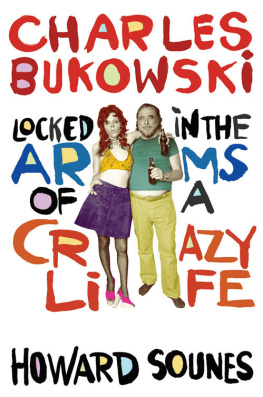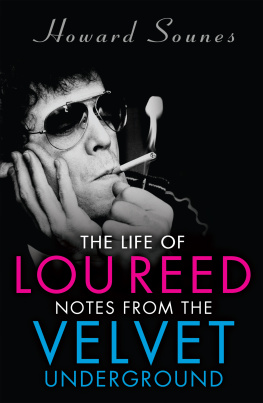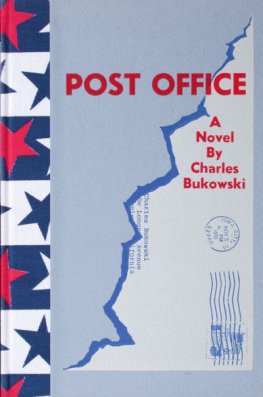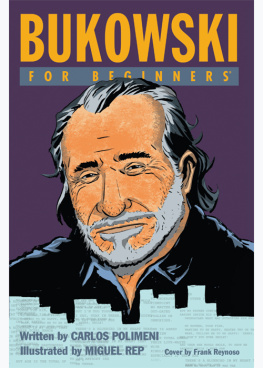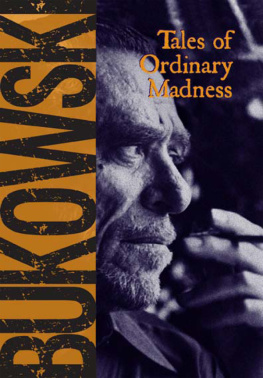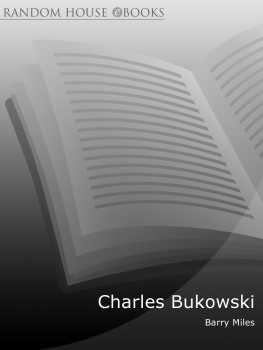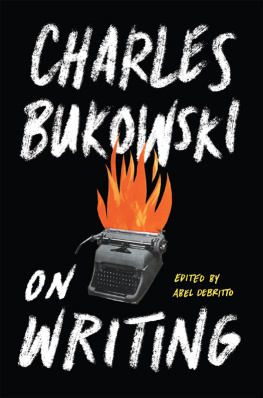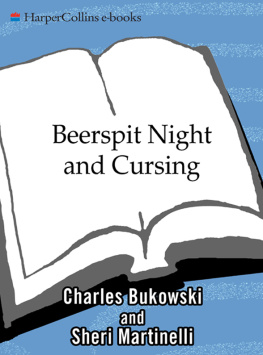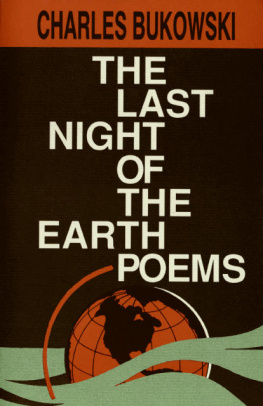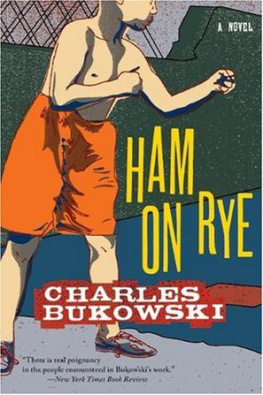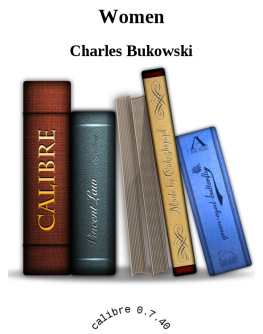R ecently a journalist emailed me from the New York Post to ask what I thought was the essence of Charles Bukowskis enduring appeal. I decided the answer was in a word: honesty. One thing about Bukowski: extraordinarily honest man, Bukowskis publisher John Martin had once told me, knowing the writer better than anyone perhaps. He hated any kind of dishonesty. He hated deceit. Bukowski edited and often exaggerated his life story to make works of fiction. Sometimes he changed his story quite considerably, as I explain in this book. Nevertheless, he faced himself squarely in the mirror each day, writing about himself with extraordinary candour even when the reflection was unflattering. Personal honesty shines through all of the writing, making Bukowski an author one learns to trust and indeed comes to love.
Humour is often the companion of honesty, and Bukowski was the first to laugh at himself, as he laughed at the crazy world around him. A heightened sense of the absurd is in almost everything he published. Reading Bukowski, one can imagine him chuckling as he wrote, the laughter in the stories and poems being one of the happy secrets that we, his admirers, share, while those yet to discover Bukowskis books regard him only too often as merely a dirty old man.
He created and played up to that image, of course, writing a newspaper column for years called Notes of a Dirty Old Man, sex stories mostly, that were collected in a book of the same name in 1969, a historically important publication in terms of his career and still a popular book with the public, but not, I would suggest, his very best work. Bukowski was always a bawdy writer, but these stories, and others he wrote for porn magazines such as Hustler, were not truly characteristic of his oeuvre. Rather it was hack work, done for the money. Relationships between men and women are tackled in a much more engaging and convincing way in poetry books such as Love is a Dog From Hell and his superb third novel, Women. Here Henry Chinaski (Bukowskis recurring, autobiographical character) is not just getting laid, though he frequently is, he is a man alternately lifted up and defeated by love, often obsessional love, a subject Bukowski wrote about with tenderness and wit. Chinaski is an endearingly fallible lover: sexually insecure, sometimes impotent and often jealous. Occasionally Chinaski is also violent, as was the case in life. The author broke the nose of one girlfriend, the sculptress Linda King, as I relate in Chapter 8 of this biography, while four chapters later I describe how he kicked another girlfriend during a TV interview. Both times he was under the influence of drink, and it is impossible to write about Bukowski without addressing his alcoholism.
Interestingly, Bukowski didnt classify himself as an alcoholic, and neither did his widow Linda Lee (she who was kicked, later his second wife). Linda Lee told me that Bukowski was a smart drunk, making a distinction in her mind between people who are incapacitated by booze and those, like Bukowski, who drink to excess and yet still do their work. Hank remained prolific, she argued, calling her husband by his pet name (Hank from Henry, Henry Charles Bukowski Jnr being his full name). I dont call that alcoholism. I think alcoholism is when you drink and you cant do anything anymore. Despite what Linda Lee says, it may seem as clear to you as it is to me that Bukowski was indeed an alcoholic, literally a roaring drunk for much of his life. This book is filled to the brim with stories of his Bacchanalian misadventures. In a sense, his drinking was his way of putting two fingers up at society. Booze was also the authors escape from a world he found cruel and hurtful, for along with his other characteristics Bukowski was an exceptionally sensitive man. He writes a great deal about drinking, of course, and said in interviews that he felt he couldnt function without alcohol. Yet towards the end of his life, when he was ill with leukaemia, Bukowski was obliged to quit the bottle, and in doing so he found that he could write perfectly well sober. If he had made that discovery earlier he might have avoided a great deal of the ugliness, tedium and humiliation that comes with alcoholism, though he would not have got into the scrapes that provided material for his stories. In any event, it is unfortunate that many people see Bukowski primarily as a drunkard, while it also seems regrettable to me that some impressionable fans make a fetish of his drinking. It was, in many ways, beside the point.
In the books, Bukowskis tone is often melancholy, sometimes very angry, but as mentioned he is invariably very funny, too, and is quick to recognise beauty and hope in the bleakest situation. Ultimately Bukowskis work is uplifting to read. Aside from relationships with women, and his own drinking, Bukowski has several major recurring themes. Above all else, he writes about himself, of course, obsessively so about his unhappy childhood in Los Angeles. The author lived virtually his whole life in LA, and the City of Angels is another theme. Importantly, he wrote about life in Los Angeles from a working-class perspective, or perhaps more accurately from the viewpoint of the citys underclass. Until he was forty-nine, in 1969, when he made a deal with John Martin to write full-time, Bukowski supported himself by working manual jobs. Some of these jobs, such as coconut man in a cookie factory, were comical. Others were back-breaking. All were soul-destroying. Most notably, Bukowski worked for the US Postal Service, as a delivery man and then for many years as a sorter of mail in downtown LA. He detested the job, resenting the fact that he had to drag himself away from what he saw as his real life writing and drinking in the privacy of his apartment in East Hollywood to put in long hours at the sorting office, simply in order to pay his rent. To Bukowski, who always had a great sense of his own worth, putting a high value on his time, it went against nature to answer to a boss eight hours a day simply to earn a living.
There is a scene in Bukowskis second novel, Factotum, which illustrates this attitude to work, which itself was a major theme of his writing as well as being integral to Bukowskis idiosyncratic way of looking at the world: Henry Chinaski is being berated by a boss at an auto-parts warehouse for not pulling his weight on the job. The boss gave him a break, because he pitied Chinaski, and now he feels let down as he tells Chinaski he is fired for his general laziness. Chinaski is unrepentant, telling his employer: Ive given you my time. Its all Ive got to give its all any man has. He finishes this speech by demanding the money he is owed, which he spends at the horse races and on booze, which he drinks with his woman in a cheap room. This is where he is happy, free from his lousy, boring, soul-destroying job, living on his own terms.
This refusal to conform to the capitalist convention of an honest days work for an honest days pay, also the refusal to try and get on in life, makes Bukowski a radical American writer. In his book Against the American Dream, the academic Russell Harrison argues that Bukowski was in effect a political writer, the only major post-war American writer who has denied the efficacy of the American Dream. He had no interest in party politics or ideology, but Bukowski saw that much was wanting in modern America. Viewed from the perspective of a run-down apartment court in East LA, the American Dream evidently excluded millions of people, those ordinary Americans who struggle by on low pay cleaning hotel rooms, doing factory jobs and driving trucks in order to make the country function. The patriotic American would say that any one of these people has the chance of becoming a millionaire, but in truth the vast majority are stuck in their place. Though he was too much of a loner ever to be regarded as a man of the people, Bukowski gave expression to this underclass. When he made money later in life, Bukowski moved into a better neighbourhood, bought an expensive car and enjoyed living well, but the author remained a critic of his homeland. One of the reasons Bukowski still commands our attention is because of this refreshing take on the USA, which is another of his great themes.

